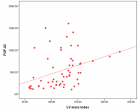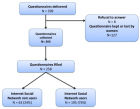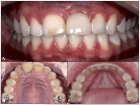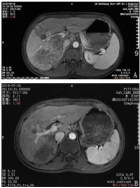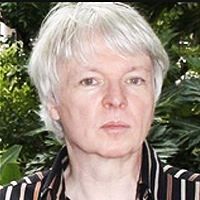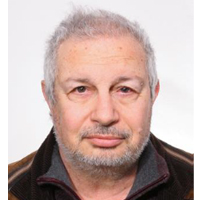Abstract
Research Article
Health professional stress during COVID-19 pandemic
Fatiha Bennaoui*, Nadia Ei Idrissi Slitine and Fadl Mrabih Rabou Maoulainine
Published: 27 July, 2020 | Volume 4 - Issue 1 | Pages: 070-072
WHO declared the coronavirus disease 2019 (COVID-19) outbreak, caused by SARS-CoV-2, to be a pandemic on March 12, 2020. In Morocco, the first case was reported in March 2nd 2020. The mental health of general population, medical and nursing staff especially has been greatly challenged.
The aim of the present article is to explore the stress status of medical and nursing staff associated with exposure to the COVID-19.
The medical staff was asked to complete a self-reported questionnaire anonymously. In University Hospital Mohamed VI, in Marrakesh, Morocco. During May 2020.
In total, 120 valid questionnaires were collected. Among them, there were 57 residents (47,5%), 30 internes (25%), 22 nurses (19%) and others: medicine students and technical staff. The age was between 23 and 60 years. 15% of professional lived alone, 85% with their family, 74% lived with an old person or with a person having a chronic disease.
In our study: the severity of symptoms in 36% of the asked professional, deaths among health professionals in 15%, death of a family member in 14%, the rapid spread of pandemic in 90%, the lack of knowledge in 83%, and finally contamination risk especially if comorbidity associated in 2%.
Further risk factors: feelings of being inadequately supported by the hospital in 42%, fear of taking home infection to family members or others in 80%, being isolated, feelings of uncertainty and social stigmatization in 43%.
The psychological presentation was the nightmare 19 in %, the insomnia in 48%, the somatization in 18%, the irritability in 22%, the aggressiveness in 14%, the nervousness in 70% and the drowsiness in 5%.
During the vulnerability of the individual’s conditions during and after the COVID-19, psychological intervention should be done and a mental health support for the health professional.
Read Full Article HTML DOI: 10.29328/journal.apmh.1001023 Cite this Article Read Full Article PDF
References
- Zhou F, Yu T, Du R. Fan G, Liu Y, et al. Clinical course and risk fac- tors for mortality of adult inpatients with COVID-19 in Wuhan, China: a retrospective cohort study. Lancet. 2020. PubMed: https://pubmed.ncbi.nlm.nih.gov/32171076/
- 2020. https://www.who.int/dg/speeches/detail/who-director-general-s-opening-remarks-at-the-media-briefing-on-covid-19
- Mediouni M, Madiouni R, ElżbietaKaczor-Urbanowicz K. COVID-19: How the quarantine could lead to the depreobesity. Obes Med. 2020; 19: 100255. PubMed: https://pubmed.ncbi.nlm.nih.gov/32427138
- World Health Organization. Novel coronavirus-China. 2020. http://www.who.int/csr/don/12-january-2020-novel-coronaviruschina/en/
- Lai J, Ma S, Wang Y, Cai Z, Hu J, et al. Factors associated with mental health outcomes among health care workers exposed to Coronavirus Disease 2019. JAMA Netw Open. 2020; 3: e203976. PubMed: https://pubmed.ncbi.nlm.nih.gov/32202646/
- Vinkers CH, van Amelsvoort T, Bisson JI, Branchi I, Cryan JF, et al. Stress resilience during the coronavirus pandemic. European Neuropsychopharmacology. 2020; 35: 12–16 PubMed: https://pubmed.ncbi.nlm.nih.gov/32446705/
- Brooks SK, Webster RK, Smith LE, Branchi I, Cryan JF, et al. The psychological impact of quarantine and how to reduce it: rapid review of the evidence. Lancet. 395, 10227.
- Mukhtar S. Mental Health and Psychosocial Aspects of Coronavirus Outbreak in Pakistan: Psychological Intervention for Public Mental Health Crisis. Asian J Psychiat. 2020; 51: 102069. PubMed: https://www.ncbi.nlm.nih.gov/pmc/articles/PMC7161472/
Similar Articles
-
Comparison of Cardiovascular Risks following Smoking Cessation Treatments Using Varenicline vs. NRT among Schizophrenic SmokersSusan Abughosh*,I-Hsuan Wu,Hua Chen,Ekere James Essien,Michael Johnson,Patrick Bordnick2,Ronald J Peters. Comparison of Cardiovascular Risks following Smoking Cessation Treatments Using Varenicline vs. NRT among Schizophrenic Smokers. . 2017 doi: 10.29328/journal.apmh.1001001; 1: 001-010
-
Impact of four obesity interventions on biometric measures of individuals positive and negative for food addictionTrina Aguirre*,Leeza Struwe,Ann Koehler,Rebecca Kreman,Rebecca Bowman,Erica Schulte,Kayla Pierce,Molly Bloodgood,effrey Holloway. Impact of four obesity interventions on biometric measures of individuals positive and negative for food addiction. . 2018 doi: 10.29328/journal.apmh.1001002; 2: 001-0005
-
Psychosocial care is necessary in supporting refugeesGudrun Widders*,Ute Teichert. Psychosocial care is necessary in supporting refugees. . 2018 doi: 10.29328/journal.apmh.1001003; 2: 006-008
-
Mental health promotion program in the workplace with focus on transportOlaf Jensen*,Fereshteh Baygi,George Charalambous,Agnes Flores,Lise Hedegaard Laursen,David Lucas,Debbie Andrioti. Mental health promotion program in the workplace with focus on transport. . 2019 doi: 10.29328/journal.apmh.1001004; 3: 001-011
-
Diseases of the mental sphere revealed by the psychiatrist at contingent of patients of the consultative outpatient admissionShapovalova LA*,Shapovalov КA. Diseases of the mental sphere revealed by the psychiatrist at contingent of patients of the consultative outpatient admission. . 2019 doi: 10.29328/journal.apmh.1001005; 3: 012-019
-
Cognition and Memory Impairment among Patients of Depression in Pakistan-The Role of Conventional and Newer Anti-DepressantsMadeeha Malik*,Muhammad Usama Khan,Azhar Hussain,Ayisha Hashmi. Cognition and Memory Impairment among Patients of Depression in Pakistan-The Role of Conventional and Newer Anti-Depressants. . 2019 doi: 10.29328/journal.apmh.1001006; 3: 020-024
-
Effectiveness of ethinyl oestradiol /cyproterone acetate and ethinyl oestradiol/ desogestrel with or without low-dose metformin on perceived health-related quality of life in hirsute women with polycystic ovary disease: A randomised, double-blind, placebo-controlled studySanjeewani Fonseka*,B Subhani,V Alahakoon,CN Wijeyaratne,IB Gawarammana,NS Kalupahana,N Ratnatunga,S Rosairo,PVR Kumarasiri. Effectiveness of ethinyl oestradiol /cyproterone acetate and ethinyl oestradiol/ desogestrel with or without low-dose metformin on perceived health-related quality of life in hirsute women with polycystic ovary disease: A randomised, double-blind, placebo-controlled study. . 2019 doi: 10.29328/journal.apmh.1001007; 3: 025-031
-
A Belgian program to fight child maltreatment: The “SOS children” teamsSophie Dechêne*,Emmanuel de Becker. A Belgian program to fight child maltreatment: The “SOS children” teams. . 2019 doi: 10.29328/journal.apmh.1001008; 3: 032-041
-
Microchimerism may be the cause of psychiatric disordersOsman Demirhan*,Bülent Demirbek. Microchimerism may be the cause of psychiatric disorders. . 2019 doi: 10.29328/journal.apmh.1001009; 3: 042-046
-
Transference and countertransference are linked to placebo-nocebo effects and they are an auxiliary resource of unparalleled value in general medicine: Recommendations for general practitionersJose Luis Turabian*. Transference and countertransference are linked to placebo-nocebo effects and they are an auxiliary resource of unparalleled value in general medicine: Recommendations for general practitioners. . 2020 doi: 10.29328/journal.apmh.1001010; 4: 001-006
Recently Viewed
-
The Cortisol Connection: Weight Gain and Stress HormonesBalvinder Singh, Neelesh Kumar Maurya*. The Cortisol Connection: Weight Gain and Stress Hormones. Arch Pharm Pharma Sci. 2024: doi: 10.29328/journal.apps.1001050; 8: 009-013
-
Evaluation of the Anti-inflammatory Activity of Equisetum arvense and Baccharis trimera FractionsCarolina Ferreira Vaz, Alan Fernandes Mariano, Júlia Amanda Rodrigues Fracasso, Marcus Vinicius Vieitas Ramos, Lucineia dos Santos, Herbert Júnior Dias*. Evaluation of the Anti-inflammatory Activity of Equisetum arvense and Baccharis trimera Fractions. Arch Pharm Pharma Sci. 2024: doi: 10.29328/journal.apps.1001049; 8: 003-008
-
Acyclovir Induced Acute Kidney Injury: A Case ReportZiauddin Mohammed*, Mariya Zoha Muskan, Megha Mohan Narayanan. Acyclovir Induced Acute Kidney Injury: A Case Report. Arch Pharm Pharma Sci. 2024: doi: 10.29328/journal.apps.1001048; 8: 001-002
-
Molecular Mechanisms and Potential Predictive Biomarkers in Advanced Non-small Cell Lung Cancer: A Summary of Current and Future TrendsIsabella Sforzin*, Juliana Rodrigues Beal, Fernando Moura. Molecular Mechanisms and Potential Predictive Biomarkers in Advanced Non-small Cell Lung Cancer: A Summary of Current and Future Trends. Arch Surg Clin Res. 2024: doi: 10.29328/journal.ascr.1001082; 8: 039-061
-
Flood Risk Management in South-west Nigeria: Lagos as a Case StudyIdowu Michael*. Flood Risk Management in South-west Nigeria: Lagos as a Case Study. Ann Civil Environ Eng. 2024: doi: 10.29328/journal.acee.1001073; 8: 096-097
Most Viewed
-
Evaluation of Biostimulants Based on Recovered Protein Hydrolysates from Animal By-products as Plant Growth EnhancersH Pérez-Aguilar*, M Lacruz-Asaro, F Arán-Ais. Evaluation of Biostimulants Based on Recovered Protein Hydrolysates from Animal By-products as Plant Growth Enhancers. J Plant Sci Phytopathol. 2023 doi: 10.29328/journal.jpsp.1001104; 7: 042-047
-
Sinonasal Myxoma Extending into the Orbit in a 4-Year Old: A Case PresentationJulian A Purrinos*, Ramzi Younis. Sinonasal Myxoma Extending into the Orbit in a 4-Year Old: A Case Presentation. Arch Case Rep. 2024 doi: 10.29328/journal.acr.1001099; 8: 075-077
-
Feasibility study of magnetic sensing for detecting single-neuron action potentialsDenis Tonini,Kai Wu,Renata Saha,Jian-Ping Wang*. Feasibility study of magnetic sensing for detecting single-neuron action potentials. Ann Biomed Sci Eng. 2022 doi: 10.29328/journal.abse.1001018; 6: 019-029
-
Pediatric Dysgerminoma: Unveiling a Rare Ovarian TumorFaten Limaiem*, Khalil Saffar, Ahmed Halouani. Pediatric Dysgerminoma: Unveiling a Rare Ovarian Tumor. Arch Case Rep. 2024 doi: 10.29328/journal.acr.1001087; 8: 010-013
-
Physical activity can change the physiological and psychological circumstances during COVID-19 pandemic: A narrative reviewKhashayar Maroufi*. Physical activity can change the physiological and psychological circumstances during COVID-19 pandemic: A narrative review. J Sports Med Ther. 2021 doi: 10.29328/journal.jsmt.1001051; 6: 001-007

HSPI: We're glad you're here. Please click "create a new Query" if you are a new visitor to our website and need further information from us.
If you are already a member of our network and need to keep track of any developments regarding a question you have already submitted, click "take me to my Query."






